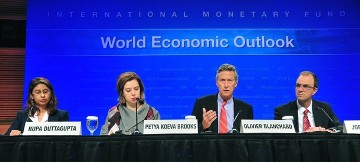Sudan’s economy seen shrinking in 2011-2012: IMF
September 21, 2011 (WASHINGTON) – The economy of post-secession Sudan will experience contraction in growth in the years 2011 and 2012, according to data released by the International Monetary Fund (IMF).

In its World Economic Outlook published this week, the IMF projected a negative real GDP growth for Sudan; -0.2% in 2011 and -0.4% in 2012. This is down from the 6.5% growth achieved in 2010 and an average of 6.7% in the years 2003-2009.
The economy will nonetheless rebound in 2016 to a 5.5% growth rate.
This month the Sudanese minister of finance and national economy Ali Mahmood Hassanein told reporters in Abu Dhabi that economic growth would be around 5% in 2011 and 6% in 2012.
The IMF further forecasted a moderate worsening of Sudan’s current account balance as percentage of GDP from -6.7% in 2010 to -7.3% in 2011 and -7.6% in 2012.
Current account balance is defined as a country’s net trade in goods and services, plus net earnings from rents, interest, profits, and dividends, and net transfer payments (such as pension funds and worker remittances) to and from the rest of the world during a specific period of time.
According to the report, consumer prices will increase by 20% in 2011 before dropping to 17.5% in 2012. The figure was at 13.0% in 2010.
Unemployment rate on the other hand will decline from 13.4% in 2011 to 12.2% in 2012.
The impact of the economic situation is beginning to be felt by the ordinary citizens in Sudan in the form of rising food prices and persistent shortage in foreign currency available.
The Bank of Sudan (BoS) governor Mohamed Khair al-Zubeir gave the clearest indication of depletion in the country’s foreign exchange reserves by saying that he asked Arab countries to deposit funds into his institution and commercial banks.
“I have requested the governors to deposit some reserves in the central bank and also in Sudanese commercial banks,” al-Zubeir told Reuters in an interview after a meeting of Arab central bankers in Qatar’s capital last week.
Zubeir said he did not ask for a precise amount, but said: “We of course need about $4 billion for this year”.
The Sudanese finance minister said in separate statements that the country needs no less than $1.3 billion to cover the budget deficit.
Because of US sanctions as well as Sudan’s heavy debt, borrowing options for the East African nation are severely limited.
The Sudanese president Omer Hassan al-Bashir told parliament last July that an economic emergency programme has been put in place for the next three years that is focused mainly on austerity measures that aims to cut spending.
Earlier this year, the Sudanese government approved an austerity package that partially removed subsidies on sugar and petroleum products, a step welcomed by the IMF.
Sudan is hoping that transit fees charged to the South for using its oil pipelines will help cushion the impact of secession. However the two sides have yet to agree on how much should be assessed for using the North’s infrastructure.
(ST)
